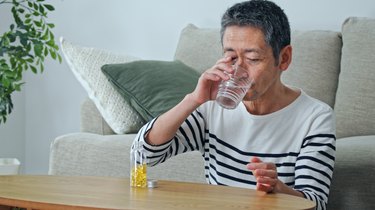
Nobody wants a shock when they visit the bathroom. But if you see bright yellow urine in the toilet, or if the smell of your pee is a bit off, you may feel a bit worried. However, there may be a simple explanation — and taking vitamin supplements is one of the most likely.
Some vitamins are fat-soluble, and others are water-soluble. With water-soluble ones (vitamin C and the eight B vitamins), whatever your body doesn't use simply comes out in your urine, according to Kristin Kirkpatrick MS, RDN, lead dietitian and manager of Wellness Nutrition Services at Cleveland Clinic Wellness & Preventive Medicine.
Video of the Day
Video of the Day
What the Color of Your Pee Is Telling You
"More specifically it tends to be an excess of riboflavin, or vitamin B2, that may turn your pee bright yellow," Kirkpatrick says. That's because riboflavin itself is a neon yellow color — it's used as a natural food coloring — and if your body has more of it than it needs, the excess will be passed through your pee.
You might wonder, should I stop taking vitamins if my pee is bright yellow?
"This won't necessarily harm your health, but may be a sign that you could take a lower-dose supplement," Kirkpatrick says.
B vitamins may also give urine a greenish tinge, according to the Cleveland Clinic, while high intakes of vitamin C can turn your pee an orange shade.
Vitamins and Smelly Pee
If it's the smell of your urine that's concerning you instead of the shade, this could also be due to water-soluble vitamins — more specifically vitamin B6, which produces musty-smelling pee, Kirkpatrick says. "Some people describe it as a bit like the smell of the vitamin tablets themselves when you open the bottle," she adds.
To avoid your pee changing color or smell, the UK's National Health Service suggests taking no more than 10 milligrams of vitamin B6 daily. However, if you don't mind weird-smelling urine, the National Center for Biotechnology Information lists the Upper Intake Level (UL) of vitamin B6 (the maximum amount it's safe for most people to consume daily from food, beverages and supplements) at 100 milligrams.
Other water-soluble vitamins that have designated ULs are:
- Vitamin C (2,000 milligrams)
- Niacin (35 milligrams)
- Folate (1,000 micrograms)
These suggested limits are for all adults.
What About Food?
But it's not just vitamins that change what's in the toilet bowl. Some foods can also affect the color of your urine, according to the Cleveland Clinic. Beets are the most well-known of this group, adding a red tinge to urine. But fava beans, blackberries and rhubarb can all turn your pee a reddish or even dark brown color, too. If you eat a lot of carrots or other vibrant veggies high in vitamin C, you might notice light orange-colored pee.
Asparagus often takes the blame for adding an ammonia smell to urine. Whether you can smell these sulfur compounds or not seems to be based on your genetic makeup. According to a December 2016 study in the BMJ, 58 percent of men and 62 percent of women have "asparagus anosmia" — in other words, they don't detect the smell of asparagus pee.
Read more: Stinky Pee: When to Blame What You Ate
Pay Attention to Your Pee
Though most temporary changes to the color and odor of your pee are harmless, some may signal a larger issue such as a bladder infection, kidney infection or even diabetes or liver failure, according to the Cleveland Clinic.
If you notice changes that don't appear to be connected to what you eat or the supplements you take, talk to your doctor. And if your urine turns red or tea-colored, reach out for medical attention right away.
- Kristin Kirkpatrick MS, RDN, lead dietitian, manager, Wellness Nutrition Services, Cleveland Clinic Wellness & Preventive Medicine, Cleveland, Ohio
- Cleveland Clinic: “Urine Changes”
- National Health Service: “Smelly Urine”
- National Institutes of Health: “Dietary Reference Intakes (DRIs): Tolerable Upper Intake Levels, Vitamins”
- BMJ: “Sniffing Out Significant ‘Pee Values’: Genome Wide Association Study of Asparagus Anosmia”